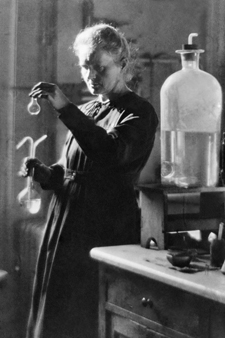How Einstein's struggles might help kids with science
Marie Curie spent years trying to isolate the radioactive element polonium to no avail. Albert Einstein had to flee Nazi Germany to avoid persecution as a Jew.
Stories of the many setbacks and hardships of these famous scientists aren't talked about as much as their great scientific achievements. But new research shows that teaching students about the struggles as well as the successes of great scientists can actually improve their grades.
For the study, more than 400 9th- and 10th-grade students from four New York City high schools in low-income areas of the Bronx and Harlem read one of three types of stories. A control group read an 800-word science textbook description of the accomplishments of Einstein, Curie, and Michael Faraday, the English scientist who discovered electromagnetic induction. The second group read about the scientists' personal struggles and a third group read about their intellectual struggles. The stories about their struggles included how they overcame them.
At the end of a six-week grading period, the students who read either of the struggle stories showed improvement in their science grades, with low-performing students improving the most. Students in the control group had grades that were even lower than before the study.
"When kids think Einstein is a genius who is different from everyone else, then they believe they will never measure up," lead researcher Xiaodong Lin-Siegler, Ph.D., said in a press release. "Many students don't realize that all successes require a long journey with many failures along the way."
Students who read stories about the scientists' struggles said that they felt connected to the people they read about, whereas students in the control group did not.
The study, published in the Journal of Educational Psychology suggests that the use of struggle stories could be a novel approach to help motivate students in science and perhaps other subjects.
"Many kids don't see science as part of their everyday lives. We teach them important content, but we never bring it to life," Lin-Siegler said. "Our science curriculum is impersonal, and kids have a hard time relating to it because they just see a long list of facts that they have to memorize."
